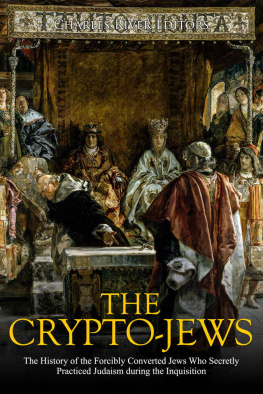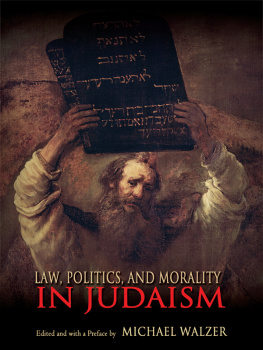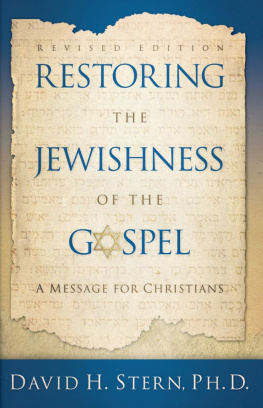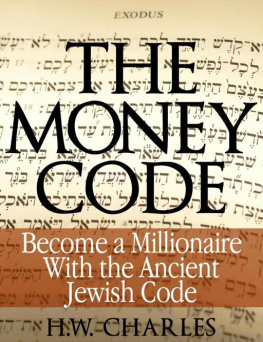HONEY FROM THE ROCK
Honey From The Rock
Sixteen Jews Find
the Sweetness of Christ
EDITED BY
ROY SCHOEMAN
IGNATIUS PRESS SAN FRANCISCO
Unless otherwise noted, Scripture quotations (except those within citations) have been taken from the Revised Standard Version of the Holy Bible, Catholic Edition. The Revised Standard Version of the Holy Bible: the Old Testament, 1952; the Apocrypha, 1957; the New Testament, 1946; the Catholic Edition of the Old Testament, incorporating the Apocrypha, 1966; the Catholic Edition of the New Testament, 1965, by the Division of Christian Education of the National Council of the Churches of Christ in the United States of America.
All rights reserved.
Cover art:
Moses Striking the Rock and the Fall of Manna , 15431545.
(Detail, left panel)
Agnolo Bronzino (15031572)
Chapel of Eleonora of Toledo, Palazzo Vecchio, Florence, Italy
Scala / Art Resource, New York
and
Christ the Redeemer
Rio di Janeiro
iStockphoto
Cover design by Roxanne Mei Lum
2007 by Ignatius Press, San Francisco
All rights reserved
ISBN 978-1-58617-115-5 (PB)
ISBN 978-1-64229-075-2 (EB)
Library of Congress Control Number 2006924091
Printed in the United States of America
CONTENTS
Remember, O Most Gracious Virgin Mary...
Alphonse Ratisbonne
Apostle of the Blessed Sacrament
Hermann Cohen
From Socialism to the Church
David Goldstein
Before the Dawn
Rabbi Israel Zolli
Taste and See the Sweetness of the Lord
Charlie Rich
Jewish Knight of Columbus
Father Arthur B. Klyber, C.SS.R .
O Adonai!
Sonia Katzmann (Sister Mary Samuele )
I Have Called You by Name; You Are Mine!
Ronda Chervin, Ph.D .
Called to Fulfillment
David Moss
All This and Heaven, Too
Rosalind Moss
Where Time Becomes Space
Judith Cabaud
Shma Yisrael to Hare Krishna to Ave Maria
Marilyn Prever
What a Long, Strange Trip Its Been
Father Peter Sabbath
God of Abraham, God of Mercy
Steven Block
Oy Vey! Hes Catholic!
Bob Fishman, B.S.C.D .
Surprised by Grace
Roy Schoeman
PREFACE
Honey from the Rock . The image is a rich one, particularly so from a Jewish-Catholic perspective. The phrase comes from Psalm 81, in which the Jewish people are promised that if they turn to God with their whole hearts, they will receive honey from the rock:
Sing aloud to God our strength;
shout for joy to the God of Jacob!
Raise a song, sound the timbrel,
the sweet lyre with the harp....
He made it a decree in Joseph,
when he went out over the land of Egypt.
I hear a voice I had not known:
I relieved your shoulder of the burden;
your hands were freed from the basket.
In distress you called, and I delivered you;
I answered you in the secret place of thunder;
I tested you at the waters of Meribah....
O Israel, if you would but listen to me!...
I am the LORD your God,
who brought you up out of the land of Egypt.
Open your mouth wide, and I will fill it....
O that my people would listen to me, that Israel would walk in my ways!...
I would feed you with the finest of the wheat,
and with honey from the rock I would satisfy you.
(Ps 81:1-2, 5-7, 8b, 10, 13, 16)
The psalm reveals Gods tender love for His people, the Jewish people. He reminds them of the protective love He showed for them in rescuing them from the land of Egypt, and then immediately reminds them of Meribah. For Meribah was where, shortly after the Jews had fled Egypt and entered the desert, they lost confidence in God and were convinced that they had been abandoned to die of thirst in the desert. It was there that they challenged Moses, Why did you bring us up out of Egypt, to kill us and our children and our cattle with thirst? (Ex 17:3), at which point God told Moses to take in your hand the rod... [and] strike the rock, and water shall come out of it, that the people may drink (Ex 17:5-6).
At Meribah God gave them water to drink, which was enough to sustain life. But in this psalm God promises ever so much more: that when Jews turn to Him with their whole hearts, He will give them honeysweetness itselfrather than water to drink.
And this was precisely the experience of the Jews whose stories fill this book. They recount lives in which, before they found Christ, something essential the essentialwas missing from their lives, making them feel like the Jews of the exodus, crossing the desert, dying of thirst. Like the Jews of the exodus, they too gave up believing that God knew them and loved them, or, in most cases, even existed. They were figuratively, and in several cases literally, dying from their desperate thirst to know the real meaning in lifeto know God, to love Him, to serve Him. And then, when through an unmerited gift of grace, God Himselfour God, our Lord, our Savior, our Messiah, our born-Jewish Jesusrevealed Himself to them, He not only gave them water to drink, to sustain them in their crossing of this desert of exile on earth on the way to the Promised Land, Heaven, He did ever so much more than that. In the overflowing richness of the intimacy with Him that He made available through the sacraments of the Catholic Church, it was not just water, but honey , a river of pure sweetness, that He gave them to drink, truly honey from the rock.
It is no coincidence that the phrase immediately preceding honey from the rock is one that, in a currently popular Communion hymn, is used to refer to the Blessed Sacramentthe gift of finest wheat. For it is precisely the gift of finest wheat, the most Holy Eucharist, which is ultimate honey from the rock: pure distilled consolation, distilled joy, distilled love, the Body, Blood, soul, and divinity of our Messiah Himself. Before becoming Catholic, it was as though trying to know God was like trying to suck water from a rock, maybe at times getting enough to moisten ones lips; but after becoming Catholic, once participating in the sacramental life of the Church, those few sparse drops became a geyser, a gusher, a tidal wave of grace sweeping one away in a flood of consolation, of intimacy with God Himself. Honey from the rock indeeda raging river of honey, flooding one away into a sea of divine intimacy.
Some of the converts or even Hasidism. Some were unschooled in Judaism, while others were among the most highly trained Jews of their day. Some were rich and wildly successful, others down and out. But one thing they all had in common was a profound (dare I say, archetypically Jewish?) longing for God that gave them no peace until they found God Himself, peace Himself in the Catholic Church. They were all dying of thirst in the desertsome actually at the point of suicide in their frustrated despair at failing to find God. And it was at that point they found so much more than they had suspected even existed. Longing for a sip of water in the parched desert, they found a river of honey, honey from the rock.
But I will let them tell their own stories. They are all unique. Alphonse Ratisbonne, a wealthy aristocratic Jewish French banker, was converted on the eve of his marriage by an unexpected, unsought, and most unwelcome (before the fact; most welcome after the fact!) apparition of the Blessed Mother herself and proceeded to call off his wedding to become a priest in the Holy Land. Hermann Cohen, one of the foremost musicians of his day, lived a wild life of fame and sensual indulgence until he was converted by an overpowering experience of the Blessed Sacrament. Rabbi Zolli, the Chief Rabbi of Rome, had an experience of Jesus while he was celebrating the Yom Kippur liturgy in the synagogue there, and he knew on the spot that was his last time officiating as Rabbi. Charlie Rich, a profoundly devout Hasidic Jew from Hungary, lost his faith on the streets of New York City and was converted by an extraordinary experience in front of a stained glass window of Jesus in an otherwise empty church. And on and on and onsixteen such stories, as different as the individuals involved, but at the same time with haunting similarities.
Next page






